Report: Legislation & Ethics in the Travel & Tourism Sector
VerifiedAdded on 2020/12/09
|28
|6022
|155
Report
AI Summary
This report examines the critical intersection of legislation and ethics within the travel and tourism sector. It begins with an introduction to the legal and regulatory frameworks, including UK law sources, and delves into specific legislation such as the Health and Safety Act 2011 and the Development of Tourism Act 1969, alongside the roles of key authorities like ATOL, SRA, ABTA, and IATA. The report then analyzes surface, sea, and air transport laws, focusing on passenger carriage and safety regulations, referencing international conventions and acts like the Athens Convention and the Warsaw Convention. It further explores the impact of health, safety, and security legislation, outlining employer and employee duties, and examines legislation related to equality. The report also addresses contract and consumer protection legislation in relation to travel and tourism customers, followed by an analysis of ethical dilemmas and a case study on the Corporate Social Responsibility policy of the Thomas Cook group. The conclusion summarizes the key findings and the importance of ethical and legal compliance for the industry's success.
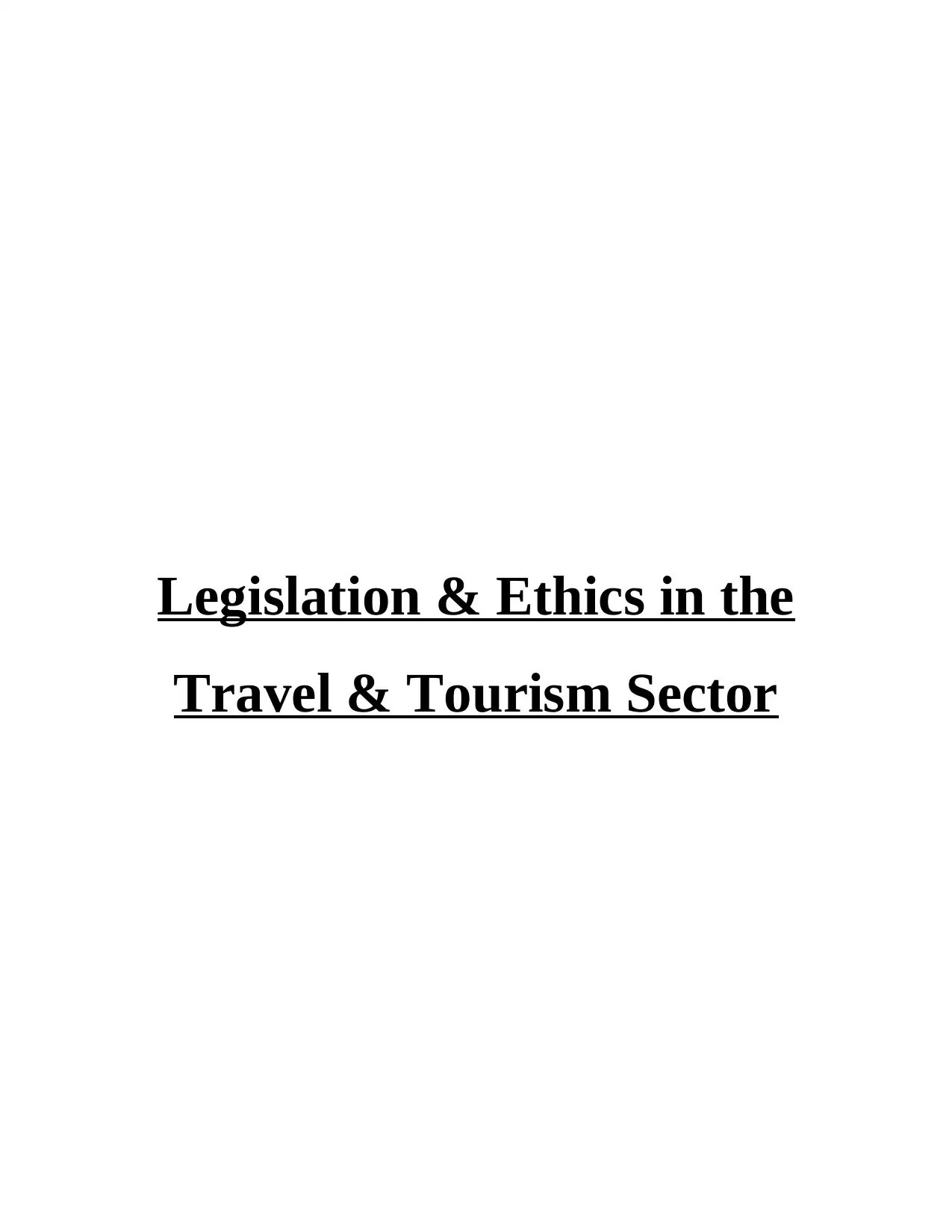
Legislation & Ethics in the
Travel & Tourism Sector
Travel & Tourism Sector
Paraphrase This Document
Need a fresh take? Get an instant paraphrase of this document with our AI Paraphraser
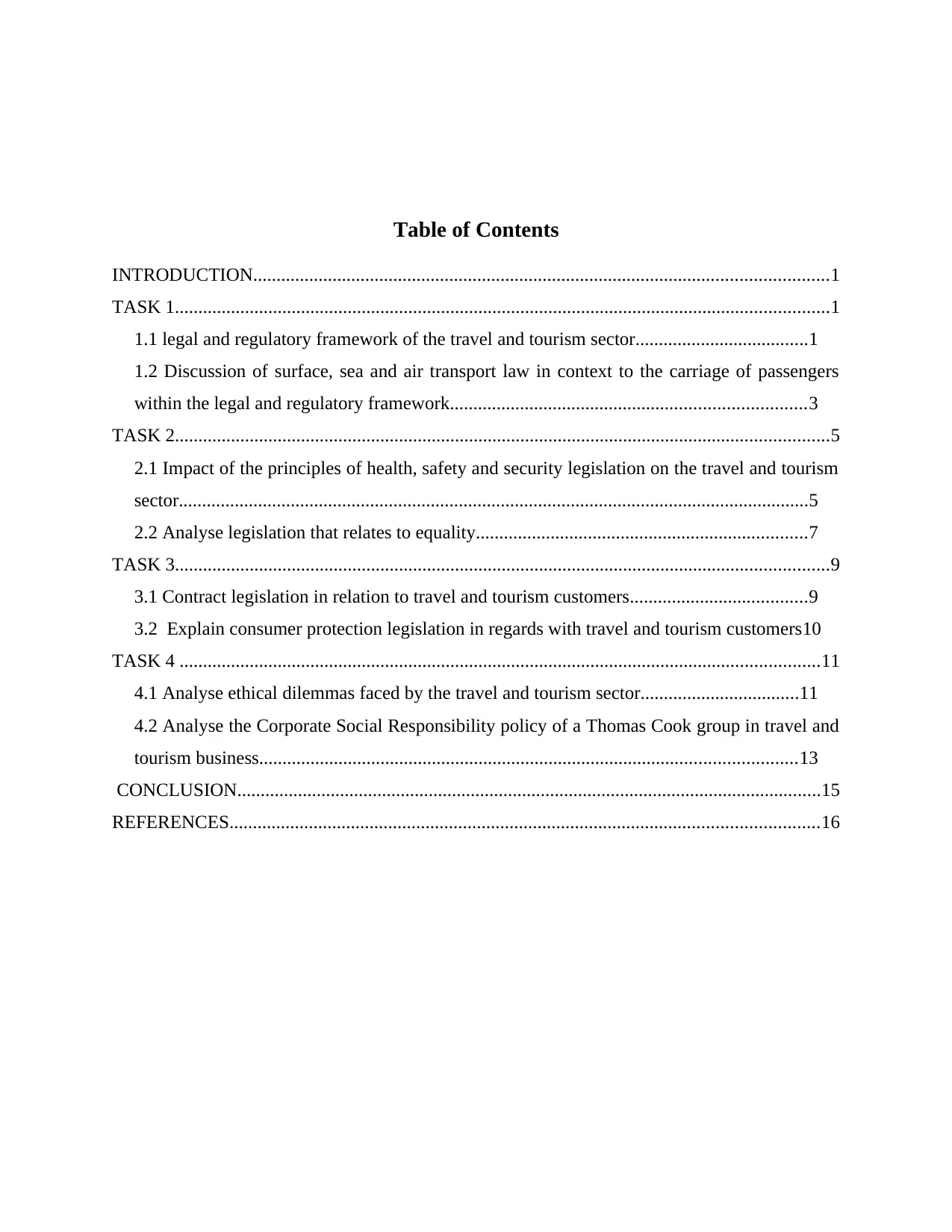
Table of Contents
INTRODUCTION...........................................................................................................................1
TASK 1............................................................................................................................................1
1.1 legal and regulatory framework of the travel and tourism sector.....................................1
1.2 Discussion of surface, sea and air transport law in context to the carriage of passengers
within the legal and regulatory framework............................................................................3
TASK 2............................................................................................................................................5
2.1 Impact of the principles of health, safety and security legislation on the travel and tourism
sector.......................................................................................................................................5
2.2 Analyse legislation that relates to equality.......................................................................7
TASK 3............................................................................................................................................9
3.1 Contract legislation in relation to travel and tourism customers......................................9
3.2 Explain consumer protection legislation in regards with travel and tourism customers10
TASK 4 .........................................................................................................................................11
4.1 Analyse ethical dilemmas faced by the travel and tourism sector..................................11
4.2 Analyse the Corporate Social Responsibility policy of a Thomas Cook group in travel and
tourism business...................................................................................................................13
CONCLUSION.............................................................................................................................15
REFERENCES..............................................................................................................................16
INTRODUCTION...........................................................................................................................1
TASK 1............................................................................................................................................1
1.1 legal and regulatory framework of the travel and tourism sector.....................................1
1.2 Discussion of surface, sea and air transport law in context to the carriage of passengers
within the legal and regulatory framework............................................................................3
TASK 2............................................................................................................................................5
2.1 Impact of the principles of health, safety and security legislation on the travel and tourism
sector.......................................................................................................................................5
2.2 Analyse legislation that relates to equality.......................................................................7
TASK 3............................................................................................................................................9
3.1 Contract legislation in relation to travel and tourism customers......................................9
3.2 Explain consumer protection legislation in regards with travel and tourism customers10
TASK 4 .........................................................................................................................................11
4.1 Analyse ethical dilemmas faced by the travel and tourism sector..................................11
4.2 Analyse the Corporate Social Responsibility policy of a Thomas Cook group in travel and
tourism business...................................................................................................................13
CONCLUSION.............................................................................................................................15
REFERENCES..............................................................................................................................16

⊘ This is a preview!⊘
Do you want full access?
Subscribe today to unlock all pages.

Trusted by 1+ million students worldwide

Paraphrase This Document
Need a fresh take? Get an instant paraphrase of this document with our AI Paraphraser
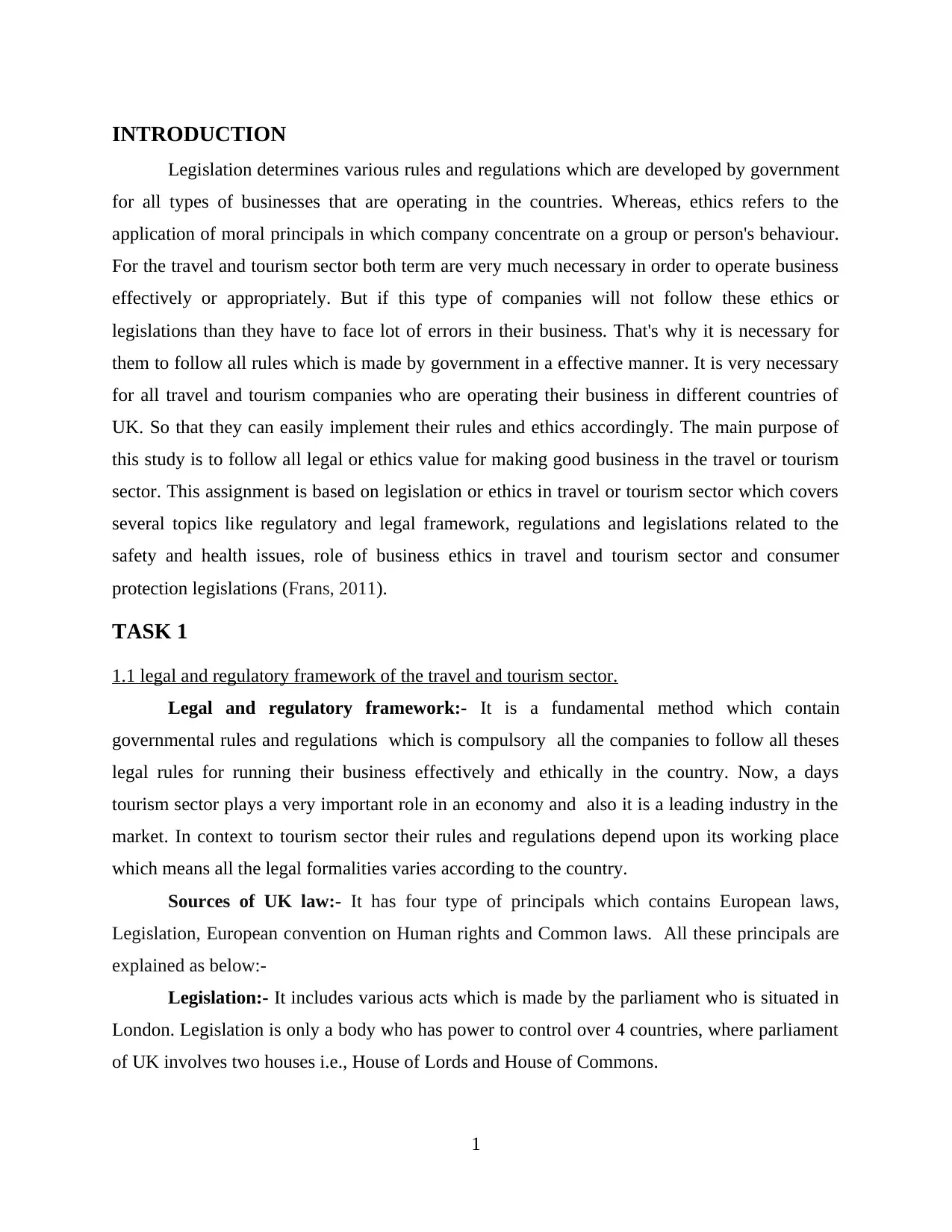
INTRODUCTION
Legislation determines various rules and regulations which are developed by government
for all types of businesses that are operating in the countries. Whereas, ethics refers to the
application of moral principals in which company concentrate on a group or person's behaviour.
For the travel and tourism sector both term are very much necessary in order to operate business
effectively or appropriately. But if this type of companies will not follow these ethics or
legislations than they have to face lot of errors in their business. That's why it is necessary for
them to follow all rules which is made by government in a effective manner. It is very necessary
for all travel and tourism companies who are operating their business in different countries of
UK. So that they can easily implement their rules and ethics accordingly. The main purpose of
this study is to follow all legal or ethics value for making good business in the travel or tourism
sector. This assignment is based on legislation or ethics in travel or tourism sector which covers
several topics like regulatory and legal framework, regulations and legislations related to the
safety and health issues, role of business ethics in travel and tourism sector and consumer
protection legislations (Frans, 2011).
TASK 1
1.1 legal and regulatory framework of the travel and tourism sector.
Legal and regulatory framework:- It is a fundamental method which contain
governmental rules and regulations which is compulsory all the companies to follow all theses
legal rules for running their business effectively and ethically in the country. Now, a days
tourism sector plays a very important role in an economy and also it is a leading industry in the
market. In context to tourism sector their rules and regulations depend upon its working place
which means all the legal formalities varies according to the country.
Sources of UK law:- It has four type of principals which contains European laws,
Legislation, European convention on Human rights and Common laws. All these principals are
explained as below:-
Legislation:- It includes various acts which is made by the parliament who is situated in
London. Legislation is only a body who has power to control over 4 countries, where parliament
of UK involves two houses i.e., House of Lords and House of Commons.
1
Legislation determines various rules and regulations which are developed by government
for all types of businesses that are operating in the countries. Whereas, ethics refers to the
application of moral principals in which company concentrate on a group or person's behaviour.
For the travel and tourism sector both term are very much necessary in order to operate business
effectively or appropriately. But if this type of companies will not follow these ethics or
legislations than they have to face lot of errors in their business. That's why it is necessary for
them to follow all rules which is made by government in a effective manner. It is very necessary
for all travel and tourism companies who are operating their business in different countries of
UK. So that they can easily implement their rules and ethics accordingly. The main purpose of
this study is to follow all legal or ethics value for making good business in the travel or tourism
sector. This assignment is based on legislation or ethics in travel or tourism sector which covers
several topics like regulatory and legal framework, regulations and legislations related to the
safety and health issues, role of business ethics in travel and tourism sector and consumer
protection legislations (Frans, 2011).
TASK 1
1.1 legal and regulatory framework of the travel and tourism sector.
Legal and regulatory framework:- It is a fundamental method which contain
governmental rules and regulations which is compulsory all the companies to follow all theses
legal rules for running their business effectively and ethically in the country. Now, a days
tourism sector plays a very important role in an economy and also it is a leading industry in the
market. In context to tourism sector their rules and regulations depend upon its working place
which means all the legal formalities varies according to the country.
Sources of UK law:- It has four type of principals which contains European laws,
Legislation, European convention on Human rights and Common laws. All these principals are
explained as below:-
Legislation:- It includes various acts which is made by the parliament who is situated in
London. Legislation is only a body who has power to control over 4 countries, where parliament
of UK involves two houses i.e., House of Lords and House of Commons.
1
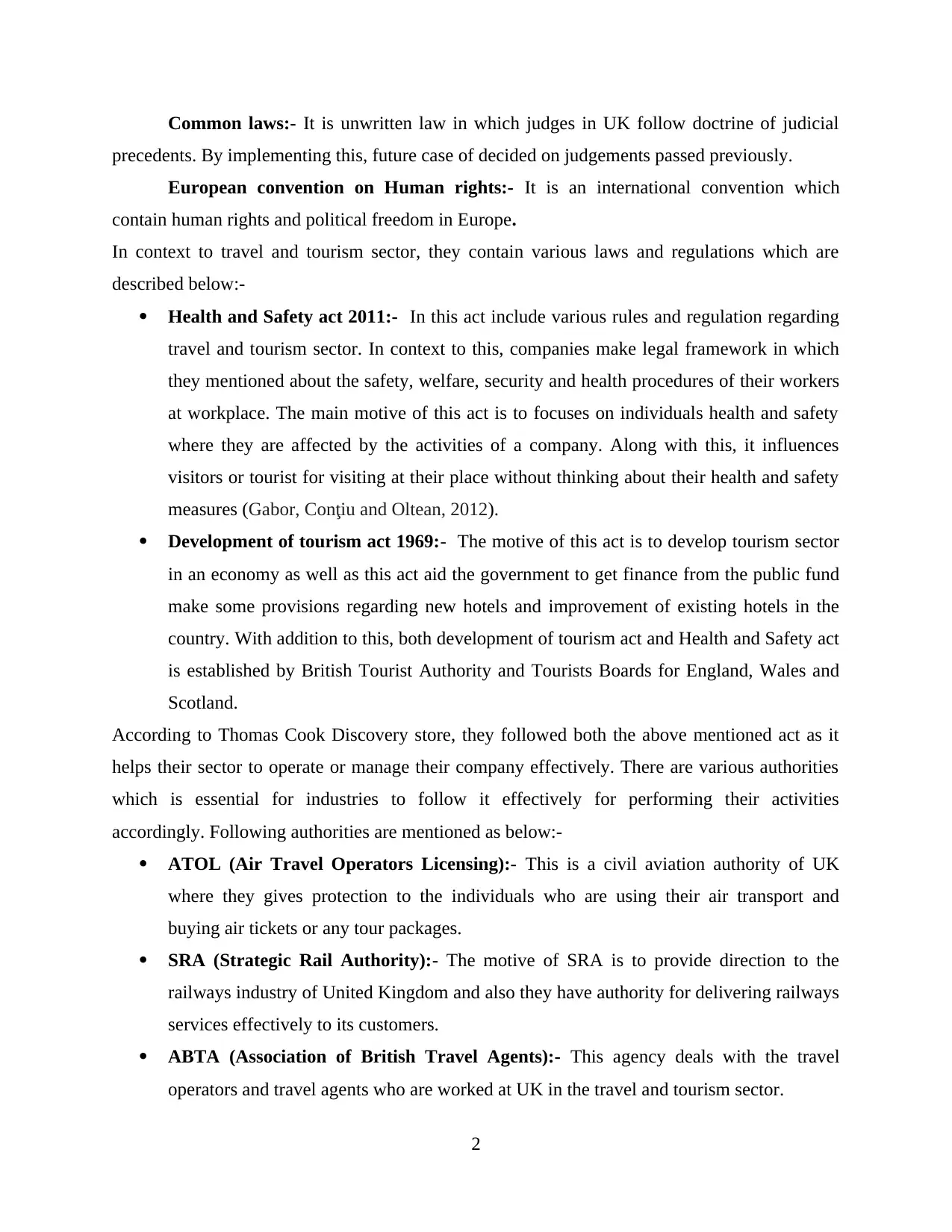
Common laws:- It is unwritten law in which judges in UK follow doctrine of judicial
precedents. By implementing this, future case of decided on judgements passed previously.
European convention on Human rights:- It is an international convention which
contain human rights and political freedom in Europe.
In context to travel and tourism sector, they contain various laws and regulations which are
described below:-
Health and Safety act 2011:- In this act include various rules and regulation regarding
travel and tourism sector. In context to this, companies make legal framework in which
they mentioned about the safety, welfare, security and health procedures of their workers
at workplace. The main motive of this act is to focuses on individuals health and safety
where they are affected by the activities of a company. Along with this, it influences
visitors or tourist for visiting at their place without thinking about their health and safety
measures (Gabor, Conţiu and Oltean, 2012).
Development of tourism act 1969:- The motive of this act is to develop tourism sector
in an economy as well as this act aid the government to get finance from the public fund
make some provisions regarding new hotels and improvement of existing hotels in the
country. With addition to this, both development of tourism act and Health and Safety act
is established by British Tourist Authority and Tourists Boards for England, Wales and
Scotland.
According to Thomas Cook Discovery store, they followed both the above mentioned act as it
helps their sector to operate or manage their company effectively. There are various authorities
which is essential for industries to follow it effectively for performing their activities
accordingly. Following authorities are mentioned as below:-
ATOL (Air Travel Operators Licensing):- This is a civil aviation authority of UK
where they gives protection to the individuals who are using their air transport and
buying air tickets or any tour packages.
SRA (Strategic Rail Authority):- The motive of SRA is to provide direction to the
railways industry of United Kingdom and also they have authority for delivering railways
services effectively to its customers.
ABTA (Association of British Travel Agents):- This agency deals with the travel
operators and travel agents who are worked at UK in the travel and tourism sector.
2
precedents. By implementing this, future case of decided on judgements passed previously.
European convention on Human rights:- It is an international convention which
contain human rights and political freedom in Europe.
In context to travel and tourism sector, they contain various laws and regulations which are
described below:-
Health and Safety act 2011:- In this act include various rules and regulation regarding
travel and tourism sector. In context to this, companies make legal framework in which
they mentioned about the safety, welfare, security and health procedures of their workers
at workplace. The main motive of this act is to focuses on individuals health and safety
where they are affected by the activities of a company. Along with this, it influences
visitors or tourist for visiting at their place without thinking about their health and safety
measures (Gabor, Conţiu and Oltean, 2012).
Development of tourism act 1969:- The motive of this act is to develop tourism sector
in an economy as well as this act aid the government to get finance from the public fund
make some provisions regarding new hotels and improvement of existing hotels in the
country. With addition to this, both development of tourism act and Health and Safety act
is established by British Tourist Authority and Tourists Boards for England, Wales and
Scotland.
According to Thomas Cook Discovery store, they followed both the above mentioned act as it
helps their sector to operate or manage their company effectively. There are various authorities
which is essential for industries to follow it effectively for performing their activities
accordingly. Following authorities are mentioned as below:-
ATOL (Air Travel Operators Licensing):- This is a civil aviation authority of UK
where they gives protection to the individuals who are using their air transport and
buying air tickets or any tour packages.
SRA (Strategic Rail Authority):- The motive of SRA is to provide direction to the
railways industry of United Kingdom and also they have authority for delivering railways
services effectively to its customers.
ABTA (Association of British Travel Agents):- This agency deals with the travel
operators and travel agents who are worked at UK in the travel and tourism sector.
2
⊘ This is a preview!⊘
Do you want full access?
Subscribe today to unlock all pages.

Trusted by 1+ million students worldwide
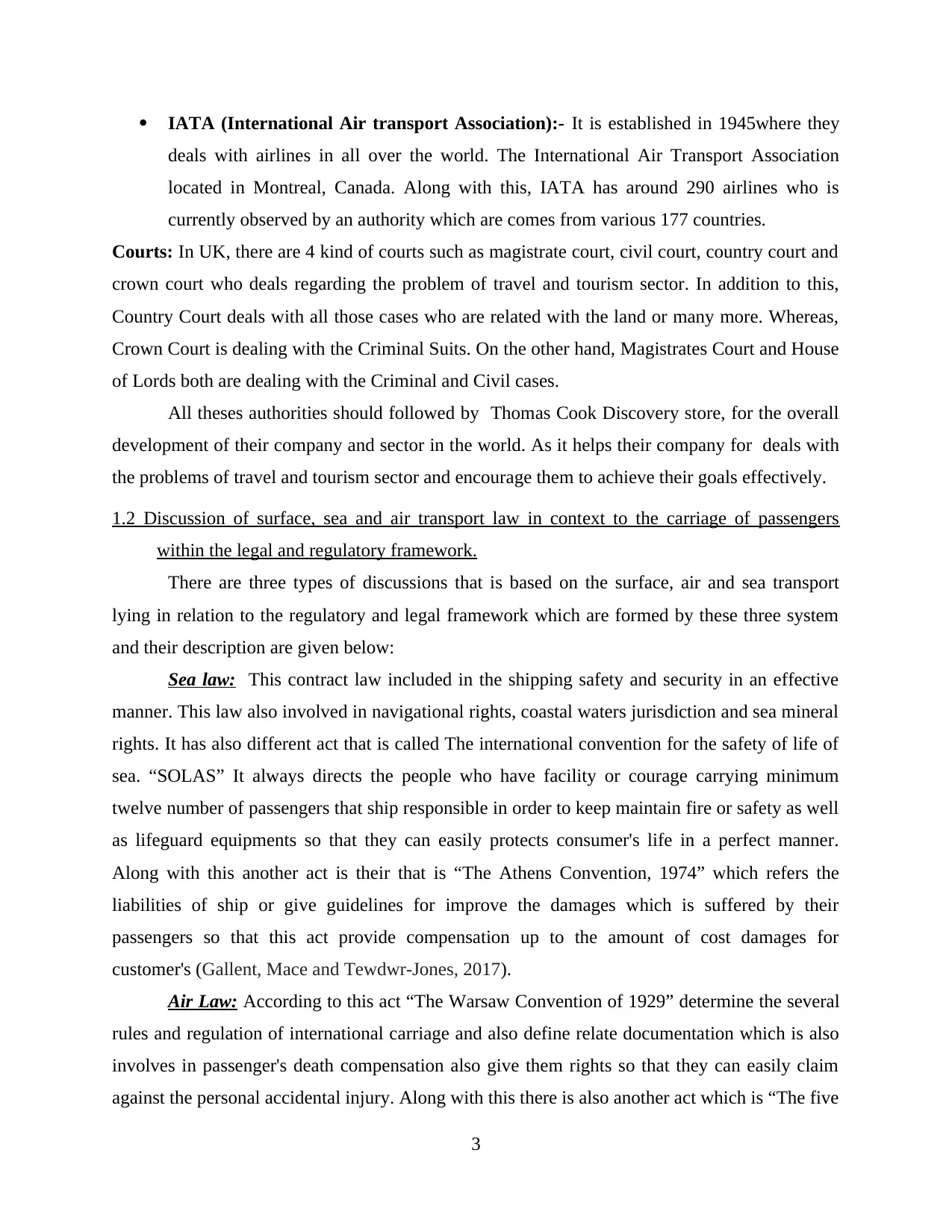
IATA (International Air transport Association):- It is established in 1945where they
deals with airlines in all over the world. The International Air Transport Association
located in Montreal, Canada. Along with this, IATA has around 290 airlines who is
currently observed by an authority which are comes from various 177 countries.
Courts: In UK, there are 4 kind of courts such as magistrate court, civil court, country court and
crown court who deals regarding the problem of travel and tourism sector. In addition to this,
Country Court deals with all those cases who are related with the land or many more. Whereas,
Crown Court is dealing with the Criminal Suits. On the other hand, Magistrates Court and House
of Lords both are dealing with the Criminal and Civil cases.
All theses authorities should followed by Thomas Cook Discovery store, for the overall
development of their company and sector in the world. As it helps their company for deals with
the problems of travel and tourism sector and encourage them to achieve their goals effectively.
1.2 Discussion of surface, sea and air transport law in context to the carriage of passengers
within the legal and regulatory framework.
There are three types of discussions that is based on the surface, air and sea transport
lying in relation to the regulatory and legal framework which are formed by these three system
and their description are given below:
Sea law: This contract law included in the shipping safety and security in an effective
manner. This law also involved in navigational rights, coastal waters jurisdiction and sea mineral
rights. It has also different act that is called The international convention for the safety of life of
sea. “SOLAS” It always directs the people who have facility or courage carrying minimum
twelve number of passengers that ship responsible in order to keep maintain fire or safety as well
as lifeguard equipments so that they can easily protects consumer's life in a perfect manner.
Along with this another act is their that is “The Athens Convention, 1974” which refers the
liabilities of ship or give guidelines for improve the damages which is suffered by their
passengers so that this act provide compensation up to the amount of cost damages for
customer's (Gallent, Mace and Tewdwr-Jones, 2017).
Air Law: According to this act “The Warsaw Convention of 1929” determine the several
rules and regulation of international carriage and also define relate documentation which is also
involves in passenger's death compensation also give them rights so that they can easily claim
against the personal accidental injury. Along with this there is also another act which is “The five
3
deals with airlines in all over the world. The International Air Transport Association
located in Montreal, Canada. Along with this, IATA has around 290 airlines who is
currently observed by an authority which are comes from various 177 countries.
Courts: In UK, there are 4 kind of courts such as magistrate court, civil court, country court and
crown court who deals regarding the problem of travel and tourism sector. In addition to this,
Country Court deals with all those cases who are related with the land or many more. Whereas,
Crown Court is dealing with the Criminal Suits. On the other hand, Magistrates Court and House
of Lords both are dealing with the Criminal and Civil cases.
All theses authorities should followed by Thomas Cook Discovery store, for the overall
development of their company and sector in the world. As it helps their company for deals with
the problems of travel and tourism sector and encourage them to achieve their goals effectively.
1.2 Discussion of surface, sea and air transport law in context to the carriage of passengers
within the legal and regulatory framework.
There are three types of discussions that is based on the surface, air and sea transport
lying in relation to the regulatory and legal framework which are formed by these three system
and their description are given below:
Sea law: This contract law included in the shipping safety and security in an effective
manner. This law also involved in navigational rights, coastal waters jurisdiction and sea mineral
rights. It has also different act that is called The international convention for the safety of life of
sea. “SOLAS” It always directs the people who have facility or courage carrying minimum
twelve number of passengers that ship responsible in order to keep maintain fire or safety as well
as lifeguard equipments so that they can easily protects consumer's life in a perfect manner.
Along with this another act is their that is “The Athens Convention, 1974” which refers the
liabilities of ship or give guidelines for improve the damages which is suffered by their
passengers so that this act provide compensation up to the amount of cost damages for
customer's (Gallent, Mace and Tewdwr-Jones, 2017).
Air Law: According to this act “The Warsaw Convention of 1929” determine the several
rules and regulation of international carriage and also define relate documentation which is also
involves in passenger's death compensation also give them rights so that they can easily claim
against the personal accidental injury. Along with this there is also another act which is “The five
3
Paraphrase This Document
Need a fresh take? Get an instant paraphrase of this document with our AI Paraphraser
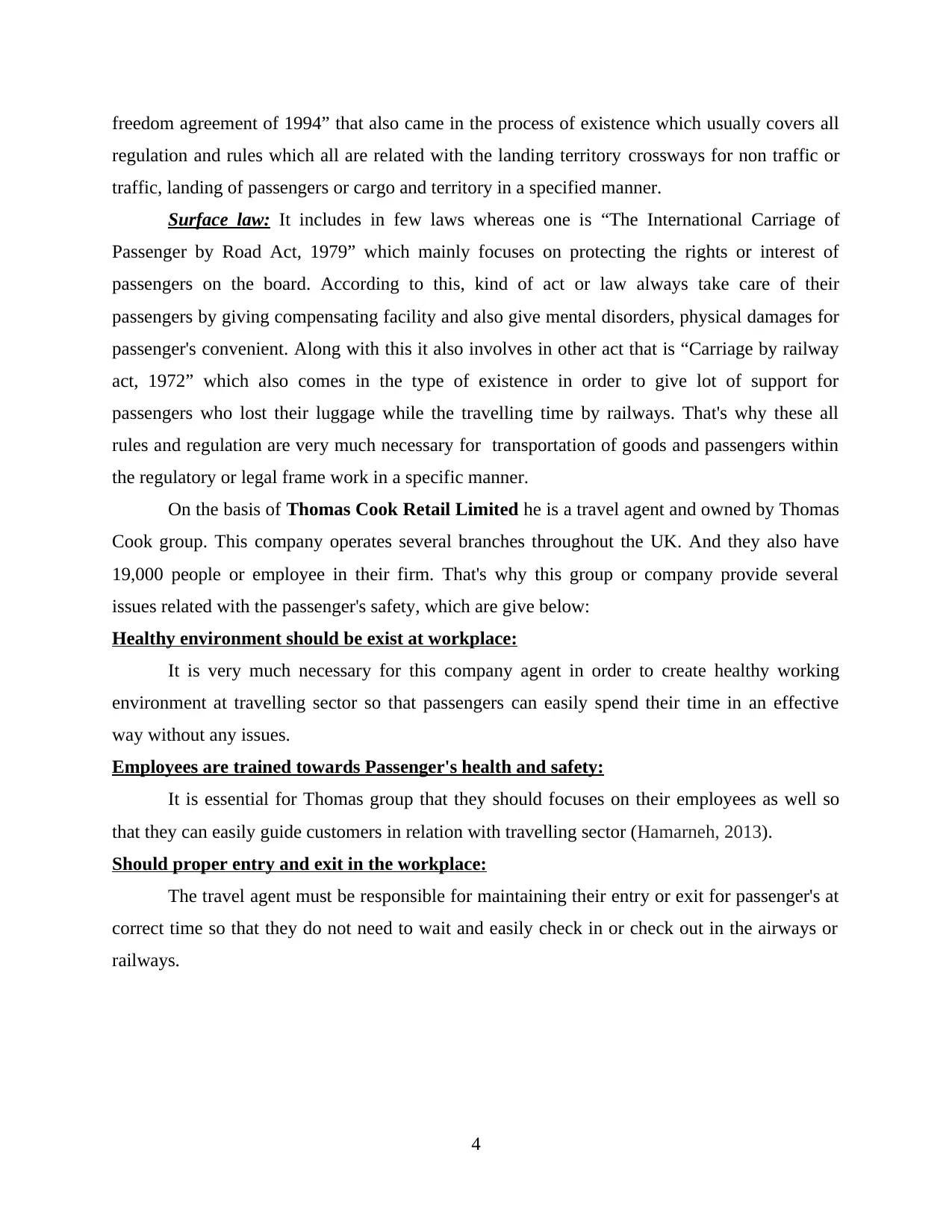
freedom agreement of 1994” that also came in the process of existence which usually covers all
regulation and rules which all are related with the landing territory crossways for non traffic or
traffic, landing of passengers or cargo and territory in a specified manner.
Surface law: It includes in few laws whereas one is “The International Carriage of
Passenger by Road Act, 1979” which mainly focuses on protecting the rights or interest of
passengers on the board. According to this, kind of act or law always take care of their
passengers by giving compensating facility and also give mental disorders, physical damages for
passenger's convenient. Along with this it also involves in other act that is “Carriage by railway
act, 1972” which also comes in the type of existence in order to give lot of support for
passengers who lost their luggage while the travelling time by railways. That's why these all
rules and regulation are very much necessary for transportation of goods and passengers within
the regulatory or legal frame work in a specific manner.
On the basis of Thomas Cook Retail Limited he is a travel agent and owned by Thomas
Cook group. This company operates several branches throughout the UK. And they also have
19,000 people or employee in their firm. That's why this group or company provide several
issues related with the passenger's safety, which are give below:
Healthy environment should be exist at workplace:
It is very much necessary for this company agent in order to create healthy working
environment at travelling sector so that passengers can easily spend their time in an effective
way without any issues.
Employees are trained towards Passenger's health and safety:
It is essential for Thomas group that they should focuses on their employees as well so
that they can easily guide customers in relation with travelling sector (Hamarneh, 2013).
Should proper entry and exit in the workplace:
The travel agent must be responsible for maintaining their entry or exit for passenger's at
correct time so that they do not need to wait and easily check in or check out in the airways or
railways.
4
regulation and rules which all are related with the landing territory crossways for non traffic or
traffic, landing of passengers or cargo and territory in a specified manner.
Surface law: It includes in few laws whereas one is “The International Carriage of
Passenger by Road Act, 1979” which mainly focuses on protecting the rights or interest of
passengers on the board. According to this, kind of act or law always take care of their
passengers by giving compensating facility and also give mental disorders, physical damages for
passenger's convenient. Along with this it also involves in other act that is “Carriage by railway
act, 1972” which also comes in the type of existence in order to give lot of support for
passengers who lost their luggage while the travelling time by railways. That's why these all
rules and regulation are very much necessary for transportation of goods and passengers within
the regulatory or legal frame work in a specific manner.
On the basis of Thomas Cook Retail Limited he is a travel agent and owned by Thomas
Cook group. This company operates several branches throughout the UK. And they also have
19,000 people or employee in their firm. That's why this group or company provide several
issues related with the passenger's safety, which are give below:
Healthy environment should be exist at workplace:
It is very much necessary for this company agent in order to create healthy working
environment at travelling sector so that passengers can easily spend their time in an effective
way without any issues.
Employees are trained towards Passenger's health and safety:
It is essential for Thomas group that they should focuses on their employees as well so
that they can easily guide customers in relation with travelling sector (Hamarneh, 2013).
Should proper entry and exit in the workplace:
The travel agent must be responsible for maintaining their entry or exit for passenger's at
correct time so that they do not need to wait and easily check in or check out in the airways or
railways.
4
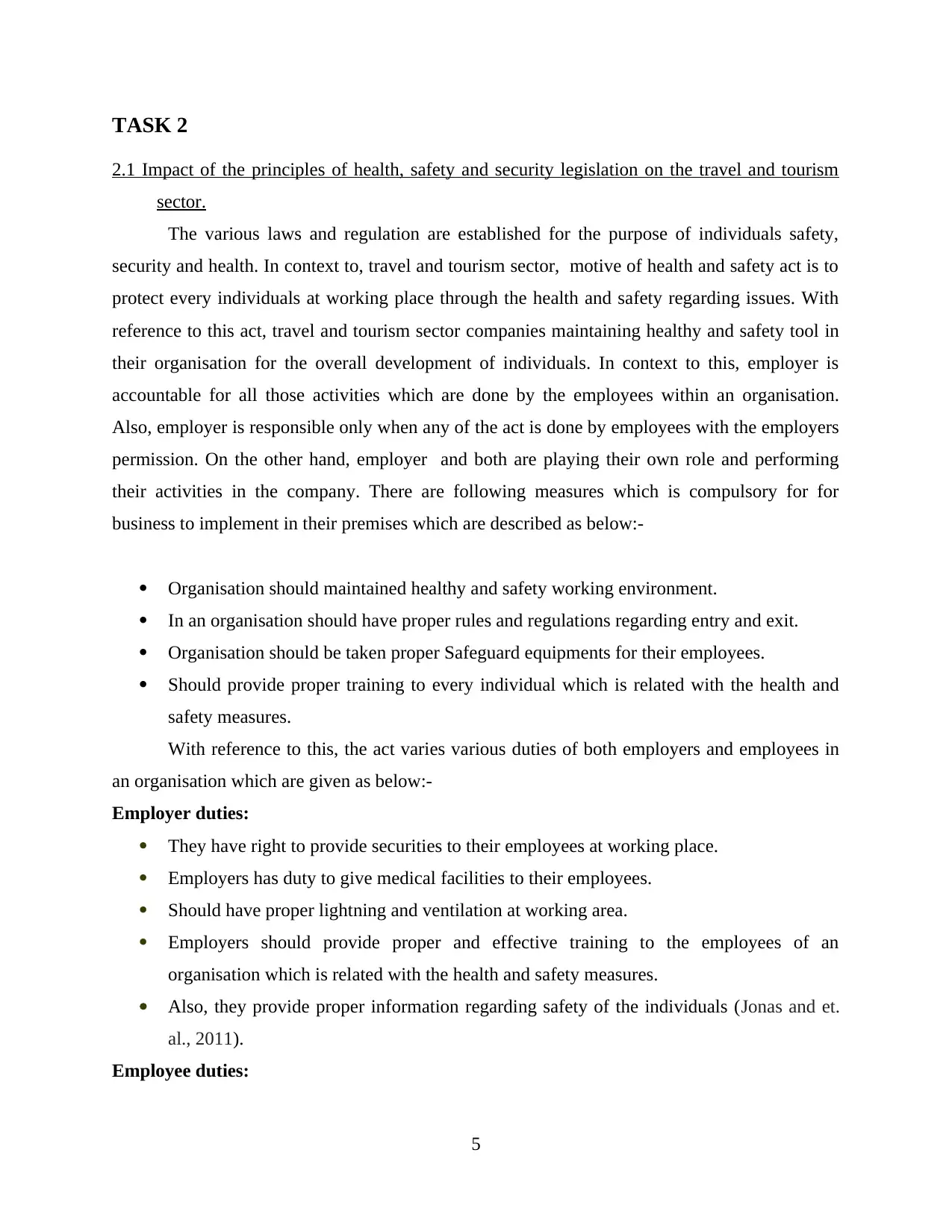
TASK 2
2.1 Impact of the principles of health, safety and security legislation on the travel and tourism
sector.
The various laws and regulation are established for the purpose of individuals safety,
security and health. In context to, travel and tourism sector, motive of health and safety act is to
protect every individuals at working place through the health and safety regarding issues. With
reference to this act, travel and tourism sector companies maintaining healthy and safety tool in
their organisation for the overall development of individuals. In context to this, employer is
accountable for all those activities which are done by the employees within an organisation.
Also, employer is responsible only when any of the act is done by employees with the employers
permission. On the other hand, employer and both are playing their own role and performing
their activities in the company. There are following measures which is compulsory for for
business to implement in their premises which are described as below:-
Organisation should maintained healthy and safety working environment.
In an organisation should have proper rules and regulations regarding entry and exit.
Organisation should be taken proper Safeguard equipments for their employees.
Should provide proper training to every individual which is related with the health and
safety measures.
With reference to this, the act varies various duties of both employers and employees in
an organisation which are given as below:-
Employer duties:
They have right to provide securities to their employees at working place.
Employers has duty to give medical facilities to their employees.
Should have proper lightning and ventilation at working area.
Employers should provide proper and effective training to the employees of an
organisation which is related with the health and safety measures.
Also, they provide proper information regarding safety of the individuals (Jonas and et.
al., 2011).
Employee duties:
5
2.1 Impact of the principles of health, safety and security legislation on the travel and tourism
sector.
The various laws and regulation are established for the purpose of individuals safety,
security and health. In context to, travel and tourism sector, motive of health and safety act is to
protect every individuals at working place through the health and safety regarding issues. With
reference to this act, travel and tourism sector companies maintaining healthy and safety tool in
their organisation for the overall development of individuals. In context to this, employer is
accountable for all those activities which are done by the employees within an organisation.
Also, employer is responsible only when any of the act is done by employees with the employers
permission. On the other hand, employer and both are playing their own role and performing
their activities in the company. There are following measures which is compulsory for for
business to implement in their premises which are described as below:-
Organisation should maintained healthy and safety working environment.
In an organisation should have proper rules and regulations regarding entry and exit.
Organisation should be taken proper Safeguard equipments for their employees.
Should provide proper training to every individual which is related with the health and
safety measures.
With reference to this, the act varies various duties of both employers and employees in
an organisation which are given as below:-
Employer duties:
They have right to provide securities to their employees at working place.
Employers has duty to give medical facilities to their employees.
Should have proper lightning and ventilation at working area.
Employers should provide proper and effective training to the employees of an
organisation which is related with the health and safety measures.
Also, they provide proper information regarding safety of the individuals (Jonas and et.
al., 2011).
Employee duties:
5
⊘ This is a preview!⊘
Do you want full access?
Subscribe today to unlock all pages.

Trusted by 1+ million students worldwide
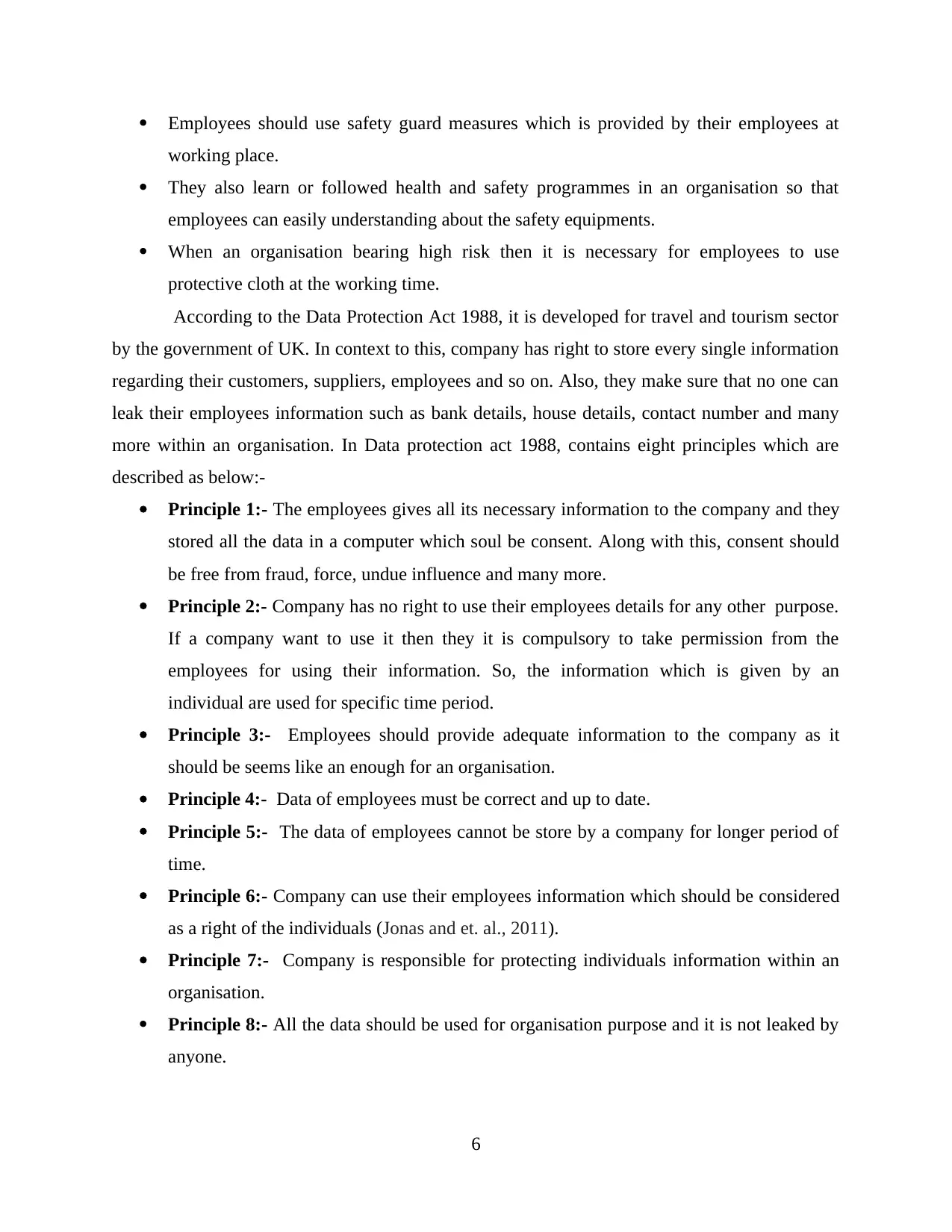
Employees should use safety guard measures which is provided by their employees at
working place.
They also learn or followed health and safety programmes in an organisation so that
employees can easily understanding about the safety equipments.
When an organisation bearing high risk then it is necessary for employees to use
protective cloth at the working time.
According to the Data Protection Act 1988, it is developed for travel and tourism sector
by the government of UK. In context to this, company has right to store every single information
regarding their customers, suppliers, employees and so on. Also, they make sure that no one can
leak their employees information such as bank details, house details, contact number and many
more within an organisation. In Data protection act 1988, contains eight principles which are
described as below:-
Principle 1:- The employees gives all its necessary information to the company and they
stored all the data in a computer which soul be consent. Along with this, consent should
be free from fraud, force, undue influence and many more.
Principle 2:- Company has no right to use their employees details for any other purpose.
If a company want to use it then they it is compulsory to take permission from the
employees for using their information. So, the information which is given by an
individual are used for specific time period.
Principle 3:- Employees should provide adequate information to the company as it
should be seems like an enough for an organisation.
Principle 4:- Data of employees must be correct and up to date.
Principle 5:- The data of employees cannot be store by a company for longer period of
time.
Principle 6:- Company can use their employees information which should be considered
as a right of the individuals (Jonas and et. al., 2011).
Principle 7:- Company is responsible for protecting individuals information within an
organisation.
Principle 8:- All the data should be used for organisation purpose and it is not leaked by
anyone.
6
working place.
They also learn or followed health and safety programmes in an organisation so that
employees can easily understanding about the safety equipments.
When an organisation bearing high risk then it is necessary for employees to use
protective cloth at the working time.
According to the Data Protection Act 1988, it is developed for travel and tourism sector
by the government of UK. In context to this, company has right to store every single information
regarding their customers, suppliers, employees and so on. Also, they make sure that no one can
leak their employees information such as bank details, house details, contact number and many
more within an organisation. In Data protection act 1988, contains eight principles which are
described as below:-
Principle 1:- The employees gives all its necessary information to the company and they
stored all the data in a computer which soul be consent. Along with this, consent should
be free from fraud, force, undue influence and many more.
Principle 2:- Company has no right to use their employees details for any other purpose.
If a company want to use it then they it is compulsory to take permission from the
employees for using their information. So, the information which is given by an
individual are used for specific time period.
Principle 3:- Employees should provide adequate information to the company as it
should be seems like an enough for an organisation.
Principle 4:- Data of employees must be correct and up to date.
Principle 5:- The data of employees cannot be store by a company for longer period of
time.
Principle 6:- Company can use their employees information which should be considered
as a right of the individuals (Jonas and et. al., 2011).
Principle 7:- Company is responsible for protecting individuals information within an
organisation.
Principle 8:- All the data should be used for organisation purpose and it is not leaked by
anyone.
6
Paraphrase This Document
Need a fresh take? Get an instant paraphrase of this document with our AI Paraphraser
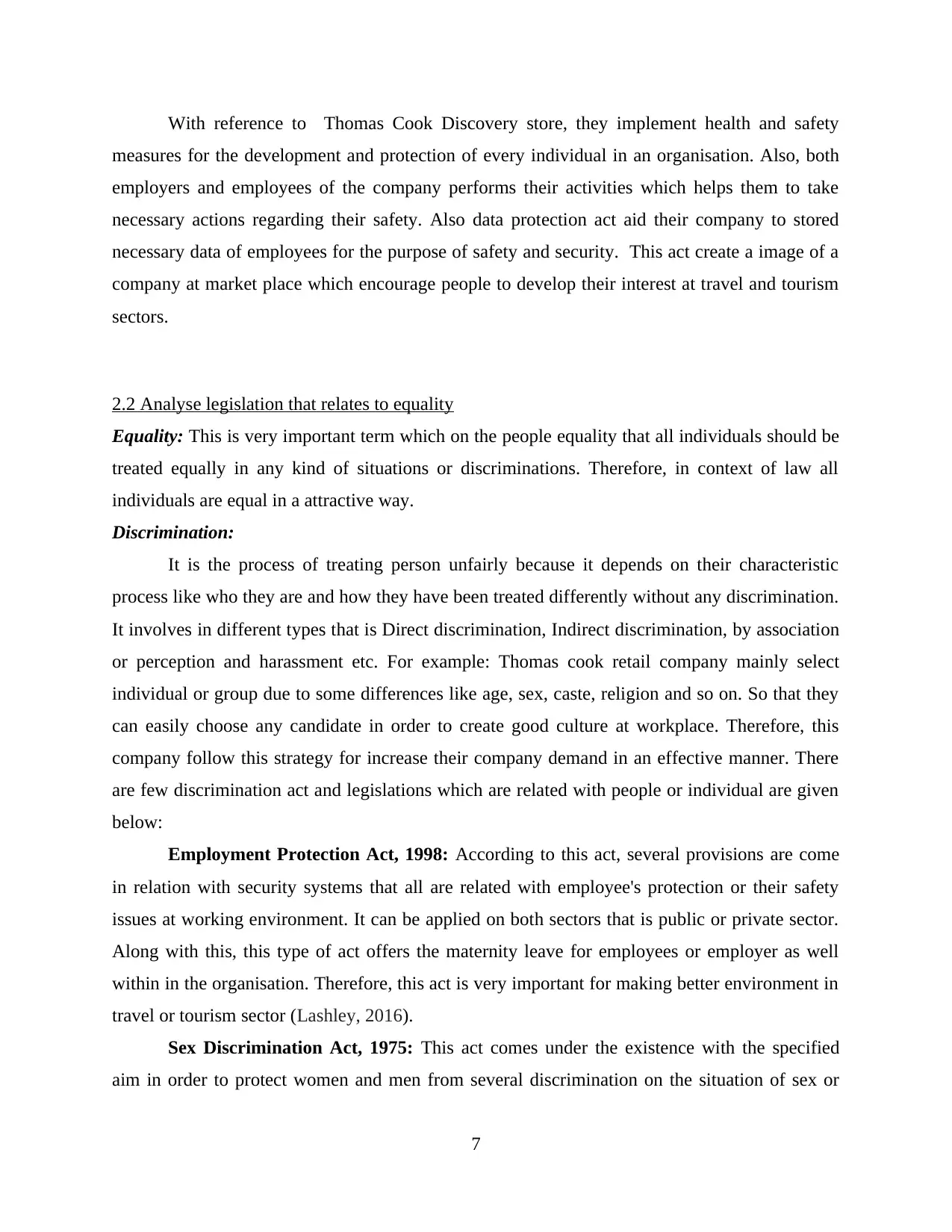
With reference to Thomas Cook Discovery store, they implement health and safety
measures for the development and protection of every individual in an organisation. Also, both
employers and employees of the company performs their activities which helps them to take
necessary actions regarding their safety. Also data protection act aid their company to stored
necessary data of employees for the purpose of safety and security. This act create a image of a
company at market place which encourage people to develop their interest at travel and tourism
sectors.
2.2 Analyse legislation that relates to equality
Equality: This is very important term which on the people equality that all individuals should be
treated equally in any kind of situations or discriminations. Therefore, in context of law all
individuals are equal in a attractive way.
Discrimination:
It is the process of treating person unfairly because it depends on their characteristic
process like who they are and how they have been treated differently without any discrimination.
It involves in different types that is Direct discrimination, Indirect discrimination, by association
or perception and harassment etc. For example: Thomas cook retail company mainly select
individual or group due to some differences like age, sex, caste, religion and so on. So that they
can easily choose any candidate in order to create good culture at workplace. Therefore, this
company follow this strategy for increase their company demand in an effective manner. There
are few discrimination act and legislations which are related with people or individual are given
below:
Employment Protection Act, 1998: According to this act, several provisions are come
in relation with security systems that all are related with employee's protection or their safety
issues at working environment. It can be applied on both sectors that is public or private sector.
Along with this, this type of act offers the maternity leave for employees or employer as well
within in the organisation. Therefore, this act is very important for making better environment in
travel or tourism sector (Lashley, 2016).
Sex Discrimination Act, 1975: This act comes under the existence with the specified
aim in order to protect women and men from several discrimination on the situation of sex or
7
measures for the development and protection of every individual in an organisation. Also, both
employers and employees of the company performs their activities which helps them to take
necessary actions regarding their safety. Also data protection act aid their company to stored
necessary data of employees for the purpose of safety and security. This act create a image of a
company at market place which encourage people to develop their interest at travel and tourism
sectors.
2.2 Analyse legislation that relates to equality
Equality: This is very important term which on the people equality that all individuals should be
treated equally in any kind of situations or discriminations. Therefore, in context of law all
individuals are equal in a attractive way.
Discrimination:
It is the process of treating person unfairly because it depends on their characteristic
process like who they are and how they have been treated differently without any discrimination.
It involves in different types that is Direct discrimination, Indirect discrimination, by association
or perception and harassment etc. For example: Thomas cook retail company mainly select
individual or group due to some differences like age, sex, caste, religion and so on. So that they
can easily choose any candidate in order to create good culture at workplace. Therefore, this
company follow this strategy for increase their company demand in an effective manner. There
are few discrimination act and legislations which are related with people or individual are given
below:
Employment Protection Act, 1998: According to this act, several provisions are come
in relation with security systems that all are related with employee's protection or their safety
issues at working environment. It can be applied on both sectors that is public or private sector.
Along with this, this type of act offers the maternity leave for employees or employer as well
within in the organisation. Therefore, this act is very important for making better environment in
travel or tourism sector (Lashley, 2016).
Sex Discrimination Act, 1975: This act comes under the existence with the specified
aim in order to protect women and men from several discrimination on the situation of sex or
7
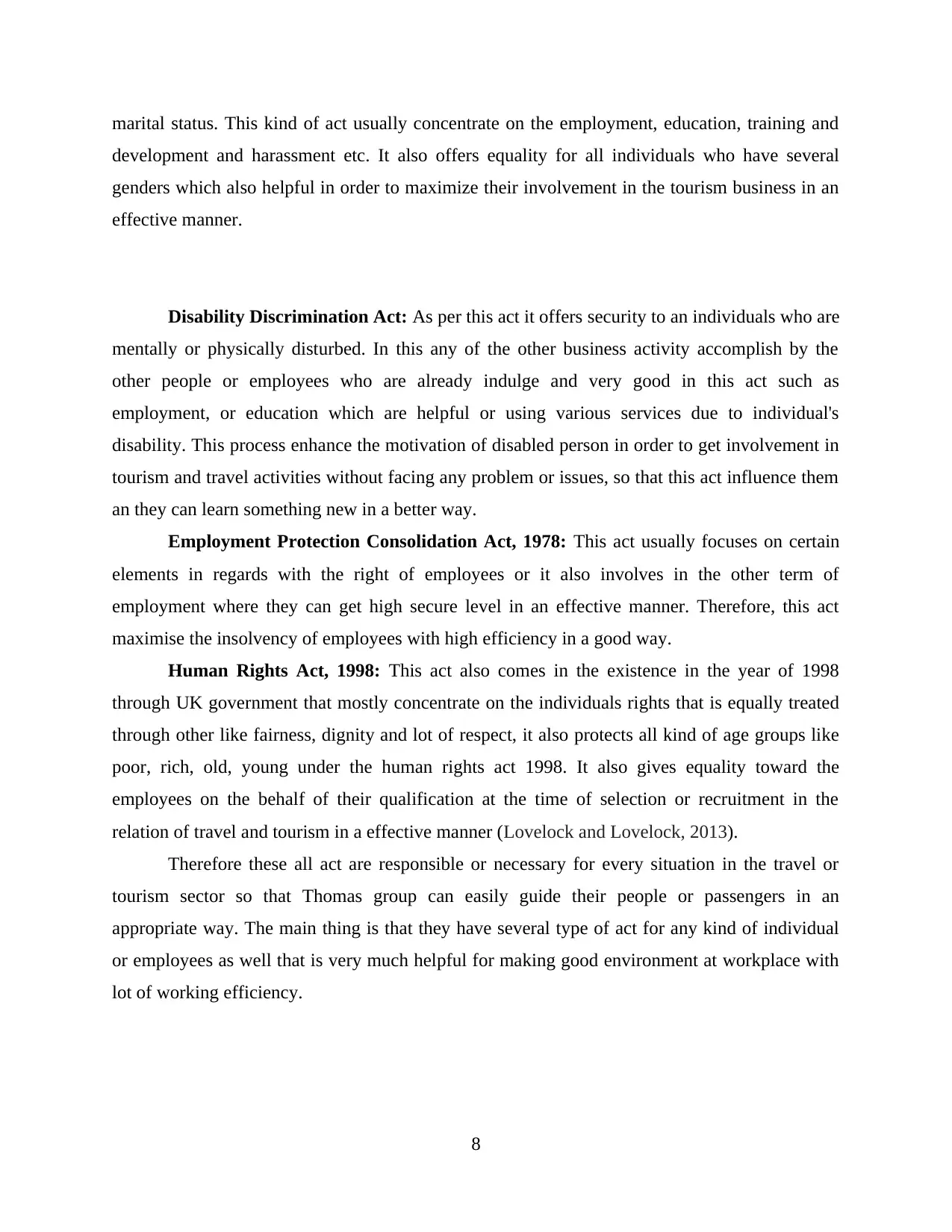
marital status. This kind of act usually concentrate on the employment, education, training and
development and harassment etc. It also offers equality for all individuals who have several
genders which also helpful in order to maximize their involvement in the tourism business in an
effective manner.
Disability Discrimination Act: As per this act it offers security to an individuals who are
mentally or physically disturbed. In this any of the other business activity accomplish by the
other people or employees who are already indulge and very good in this act such as
employment, or education which are helpful or using various services due to individual's
disability. This process enhance the motivation of disabled person in order to get involvement in
tourism and travel activities without facing any problem or issues, so that this act influence them
an they can learn something new in a better way.
Employment Protection Consolidation Act, 1978: This act usually focuses on certain
elements in regards with the right of employees or it also involves in the other term of
employment where they can get high secure level in an effective manner. Therefore, this act
maximise the insolvency of employees with high efficiency in a good way.
Human Rights Act, 1998: This act also comes in the existence in the year of 1998
through UK government that mostly concentrate on the individuals rights that is equally treated
through other like fairness, dignity and lot of respect, it also protects all kind of age groups like
poor, rich, old, young under the human rights act 1998. It also gives equality toward the
employees on the behalf of their qualification at the time of selection or recruitment in the
relation of travel and tourism in a effective manner (Lovelock and Lovelock, 2013).
Therefore these all act are responsible or necessary for every situation in the travel or
tourism sector so that Thomas group can easily guide their people or passengers in an
appropriate way. The main thing is that they have several type of act for any kind of individual
or employees as well that is very much helpful for making good environment at workplace with
lot of working efficiency.
8
development and harassment etc. It also offers equality for all individuals who have several
genders which also helpful in order to maximize their involvement in the tourism business in an
effective manner.
Disability Discrimination Act: As per this act it offers security to an individuals who are
mentally or physically disturbed. In this any of the other business activity accomplish by the
other people or employees who are already indulge and very good in this act such as
employment, or education which are helpful or using various services due to individual's
disability. This process enhance the motivation of disabled person in order to get involvement in
tourism and travel activities without facing any problem or issues, so that this act influence them
an they can learn something new in a better way.
Employment Protection Consolidation Act, 1978: This act usually focuses on certain
elements in regards with the right of employees or it also involves in the other term of
employment where they can get high secure level in an effective manner. Therefore, this act
maximise the insolvency of employees with high efficiency in a good way.
Human Rights Act, 1998: This act also comes in the existence in the year of 1998
through UK government that mostly concentrate on the individuals rights that is equally treated
through other like fairness, dignity and lot of respect, it also protects all kind of age groups like
poor, rich, old, young under the human rights act 1998. It also gives equality toward the
employees on the behalf of their qualification at the time of selection or recruitment in the
relation of travel and tourism in a effective manner (Lovelock and Lovelock, 2013).
Therefore these all act are responsible or necessary for every situation in the travel or
tourism sector so that Thomas group can easily guide their people or passengers in an
appropriate way. The main thing is that they have several type of act for any kind of individual
or employees as well that is very much helpful for making good environment at workplace with
lot of working efficiency.
8
⊘ This is a preview!⊘
Do you want full access?
Subscribe today to unlock all pages.

Trusted by 1+ million students worldwide
1 out of 28
Related Documents
Your All-in-One AI-Powered Toolkit for Academic Success.
+13062052269
info@desklib.com
Available 24*7 on WhatsApp / Email
![[object Object]](/_next/static/media/star-bottom.7253800d.svg)
Unlock your academic potential
Copyright © 2020–2025 A2Z Services. All Rights Reserved. Developed and managed by ZUCOL.



